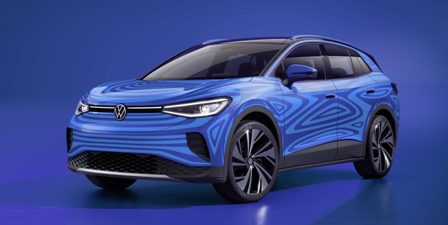Volkswagen AG’s ID series – the backbone of its electric vehicle ambitions – is off to what even company sources call a worryingly slow start in China.
Sales in May of two ID.4 electric SUV models, launched only two months earlier, came to a mere 1,213 combined. And that was about 200 fewer than in April, according to auto consultancy LMC.
The sales fall far short of initial hopes, four people with knowledge of the matter said, and what some other automakers have achieved with early sales of flagship EV offerings in the world’s largest auto market.
Volkswagen’s venture with state-owned SAIC Motor, which makes the slightly bigger ID.4 X model, had been targeting sales of 50,000-60,000 vehicles this year, according to comments by Yang Siyao, a company marketing executive, in Chinese media in March.
A separate venture between the world’s No. 2 automaker and FAW which makes the ID.4 CROZZ had similar targets, one of the sources said. Those goals now seem unrealistic.
Furthermore, both ventures’ EV plants are running below 10% of production capacity, according to three of the people.
The sources blamed the less than auspicious debut on a lack of smart tech features, fierce competition, a late launch compared to Tesla Inc (TSLA.O) and Chinese EV makers as well as hiccups with its new EV sales network.
“Sales so far are behind our earlier expectations. We’ve had to dial down production plans for the ID.4 again and again,” said one person, who like the other sources was not authorized to speak to media and declined to be identified.
“This is not healthy, but at the moment customers are not coming to buy them.”
In another sign of sales stress, SAIC-Volkswagen has suggested staff members buy ID.4s, according to an internal memo seen by Reuters.
By comparison, Tesla sold 6,612 of its Model Y in China in the first two months after its launch. The ID.4’s sales performance in China also contrasts sharply with Europe, where it is a top-selling electric car with 12,101 sold in the first two months post-launch, according to JATO Dynamics.
Volkswagen said in a statement to Reuters that ID. China sales were in line with expectations as it builds up production and a new sales network, adding it does not view Tesla’s Model Y as a direct competitor for the ID.4, which occupies a different vehicle type segment.
It also said it was confident the two ID.4 models would see sales growth and noted plans for three more ID models to be launched this year in China.
NOT SMART ENOUGH?
More than any other country, China has aggressively pushed for the adoption of electric cars, introducing sales quotas as it seeks to cut pollution, encourage the growth of its auto industry and reduce reliance on oil.
Volkswagen, the country’s biggest foreign automaker with 3.85 million vehicles – mostly gasoline – sold last year, has more riding on successfully transitioning its customers to EVs than the average automaker. It has also declared its intention to surpass Tesla as the world’s top EV maker by 2025, ensuring that China will become a crucial battleground.
But getting customers on board is another matter altogether.
At a shopping mall in western Shanghai last week, David Qian, a 50-year-old engineer, was looking for an EV for his wife but found he was not drawn to the ID.4 X, which starts at just under 200,000 yuan ($31,000).
“The car looks okay but I know it is not smart enough,” said Qian, who owns a Tesla Model 3 and enthuses about its assisted driving technology.
Unlike Tesla models and a growing number of vehicles from Chinese electric car makers like Xpeng Inc and Nio Inc, the ID.4 cannot park itself and does not offer advanced self-driving features or advanced voice-controlled functions.
“Chinese consumers value the sense of technology and science fiction of electric vehicles, and brand loyalty has always been low which is completely different from the European market,” said Yale Zhang, head of Shanghai-based consultancy AutoForesight.
And unlike Europe, electric car competition is already cutthroat in China, where a plethora of manufacturers compete and the top-selling Wuling Hong Guang MINI EV, an entry-level sedan made by a General Motors joint venture, costs just 28,800 yuan ($4,450).
At the shopping mall where Qian checked out the ID.4, the SAIC-Volkswagen showroom is right next door to a store run by Xpeng and close to rival stores belonging to EV startup Neta and Huawei, which sells an electric car in partnership with automaker Seres. A store for Chinese EV maker Airways is also set to open nearby soon.
“Compared with Europe, this car has too much competition and they are all new models with a strong tech sense,” said Zhang.
Volkswagen said in its statement it would be offering new software feature updates in the future and with newer models. (Reuters)
©Copyright MOTORING WORLD INTERNATIONAL.
All rights reserved. Materials, photographs, illustrations and other digital content on this website, may not be reproduced, published, broadcast, rewritten or redistributed in whole or in part without prior written permission from Motoring World International
Contact: [email protected]





